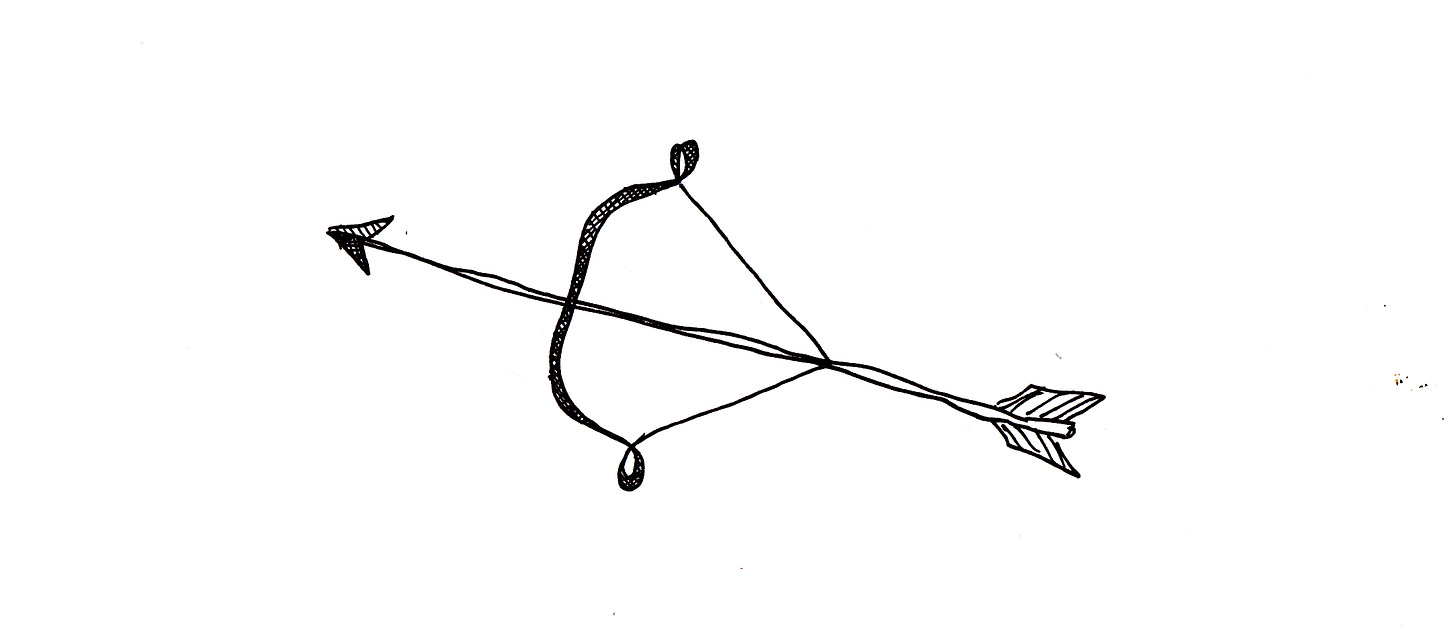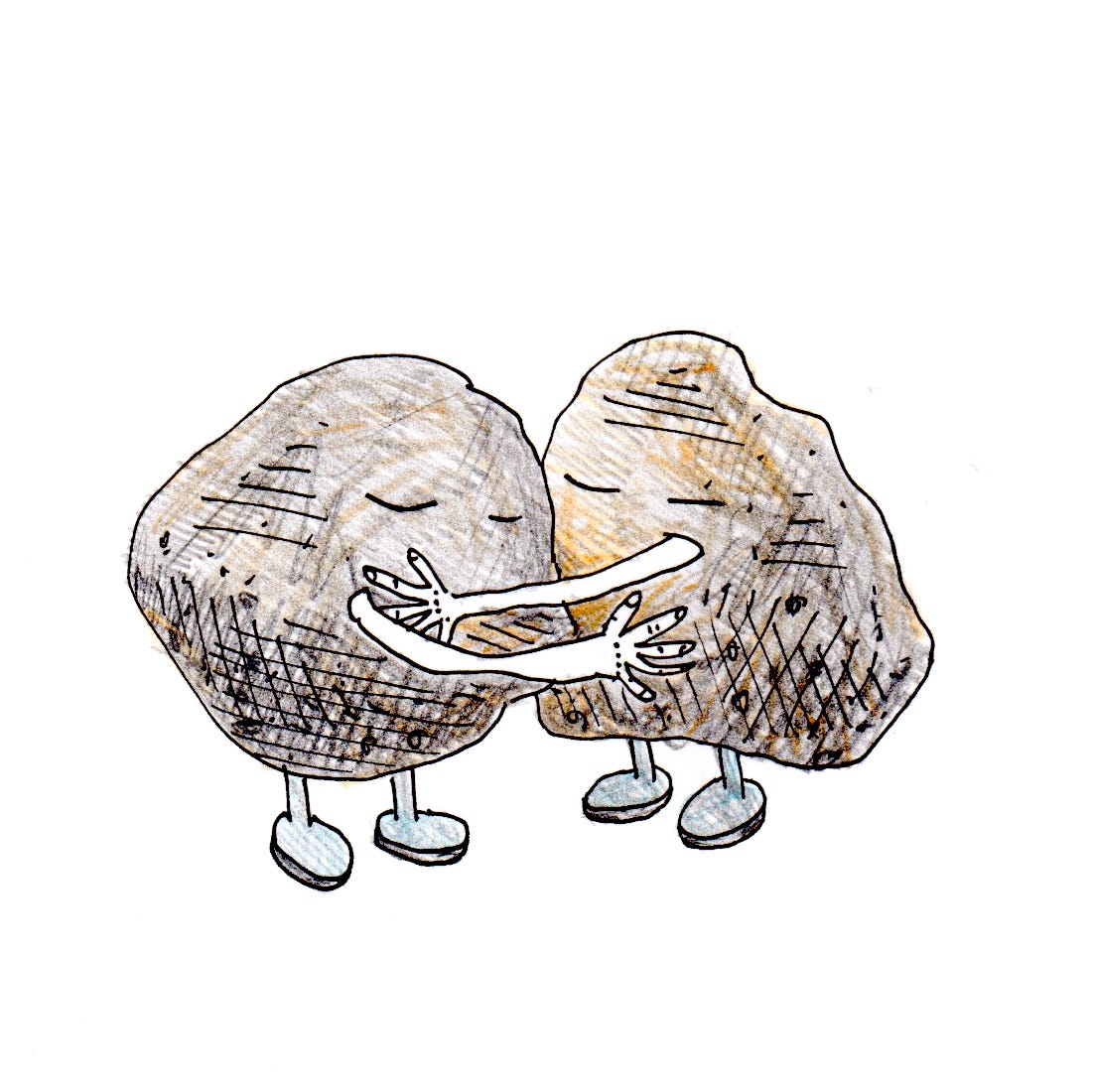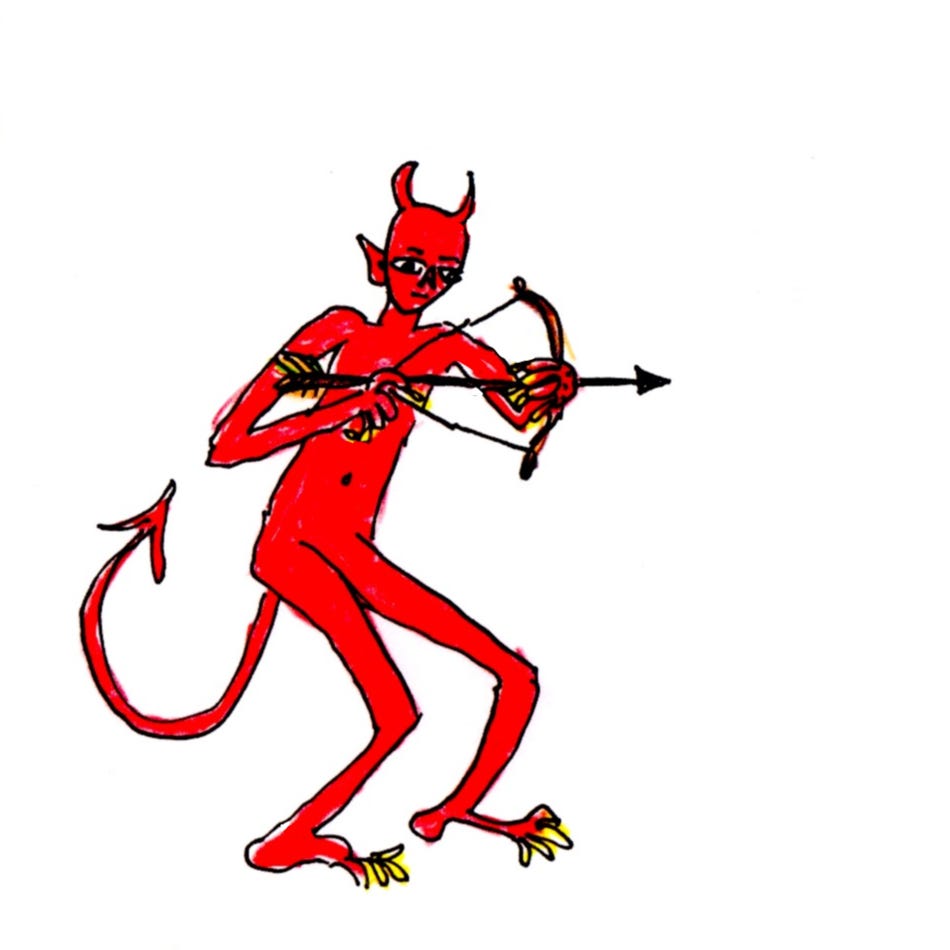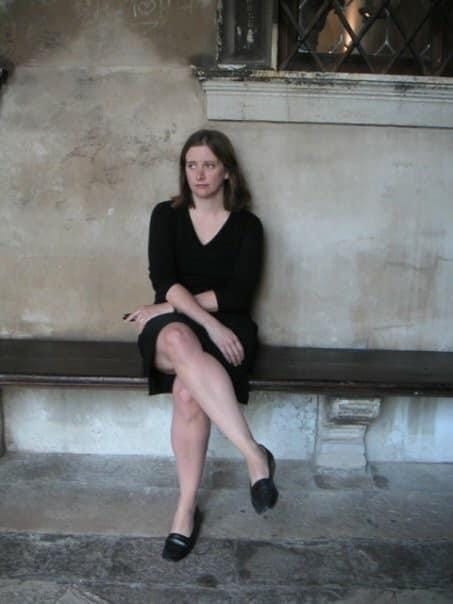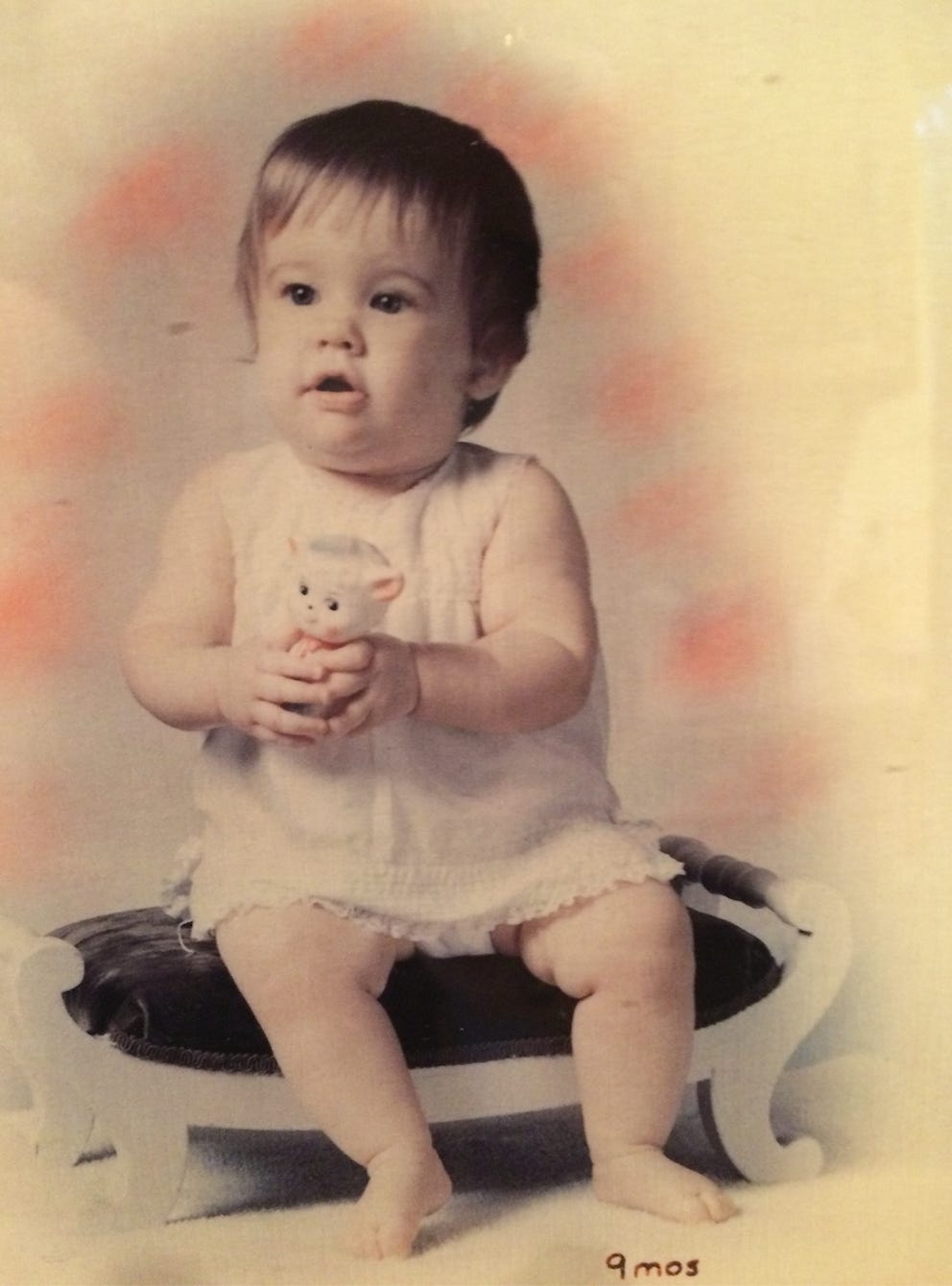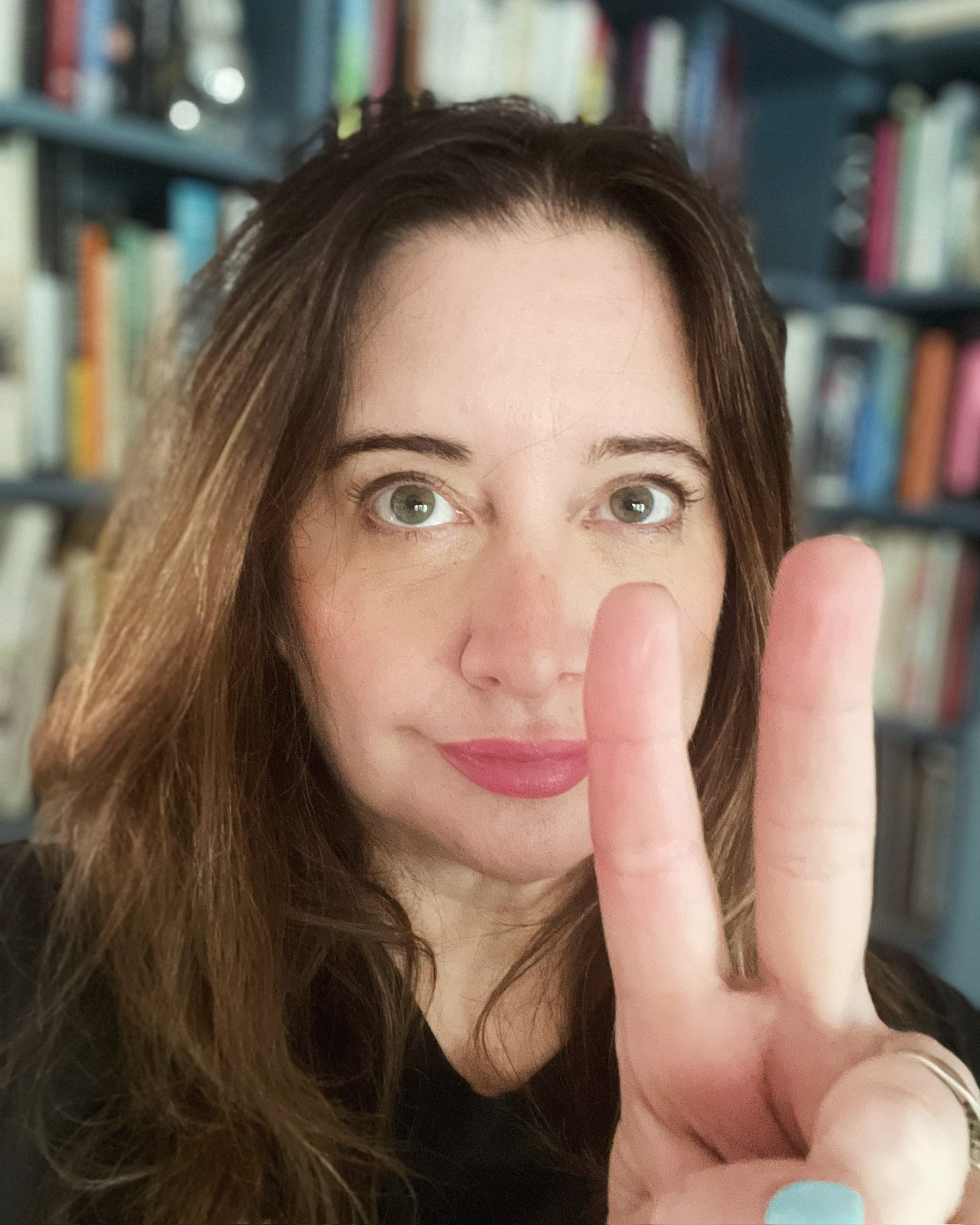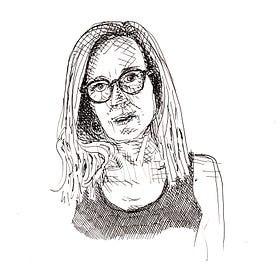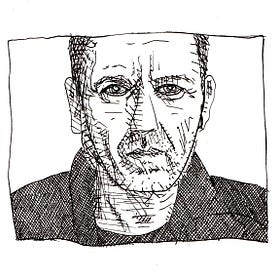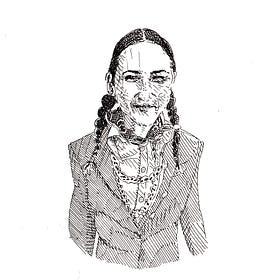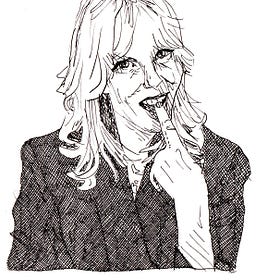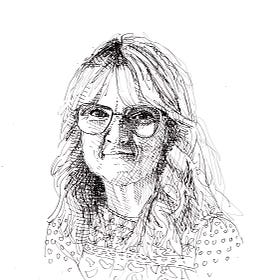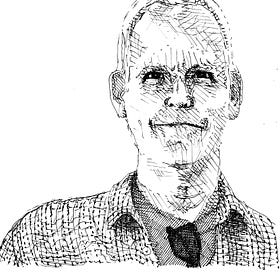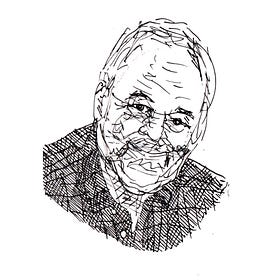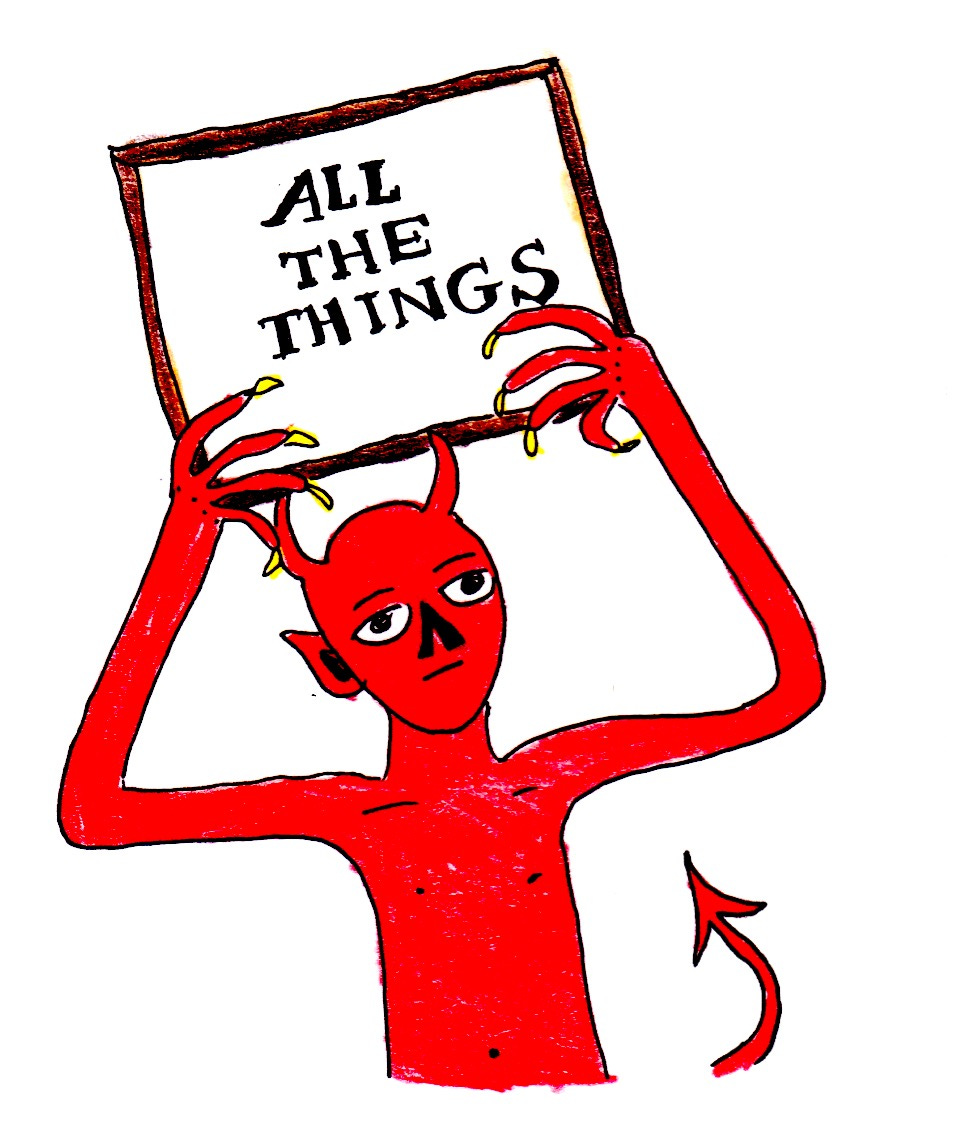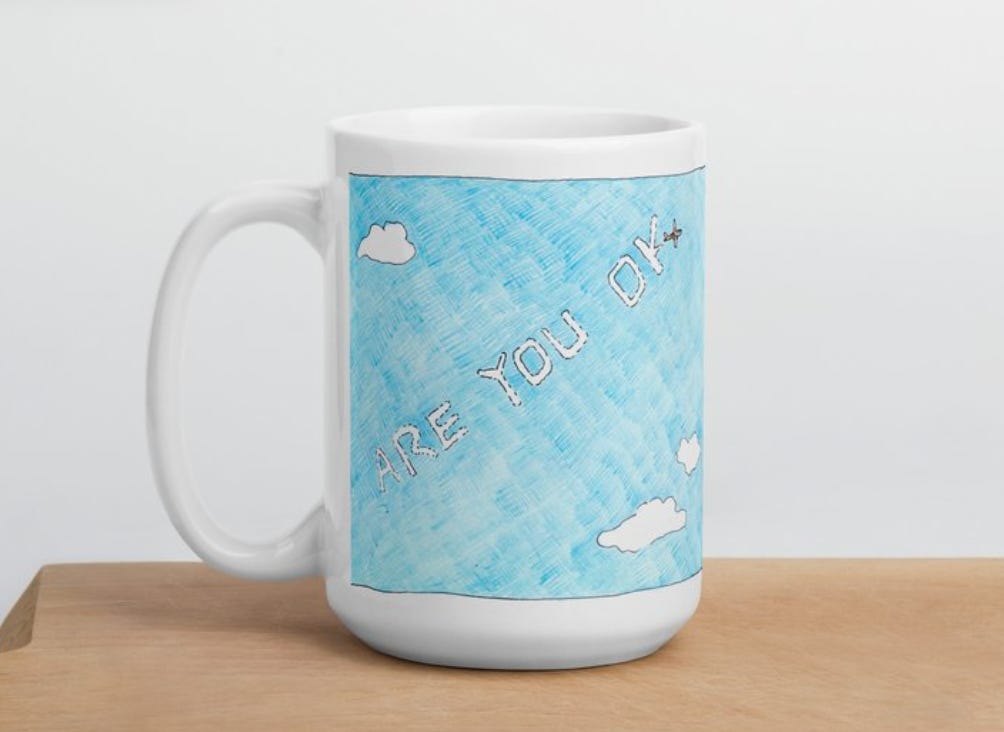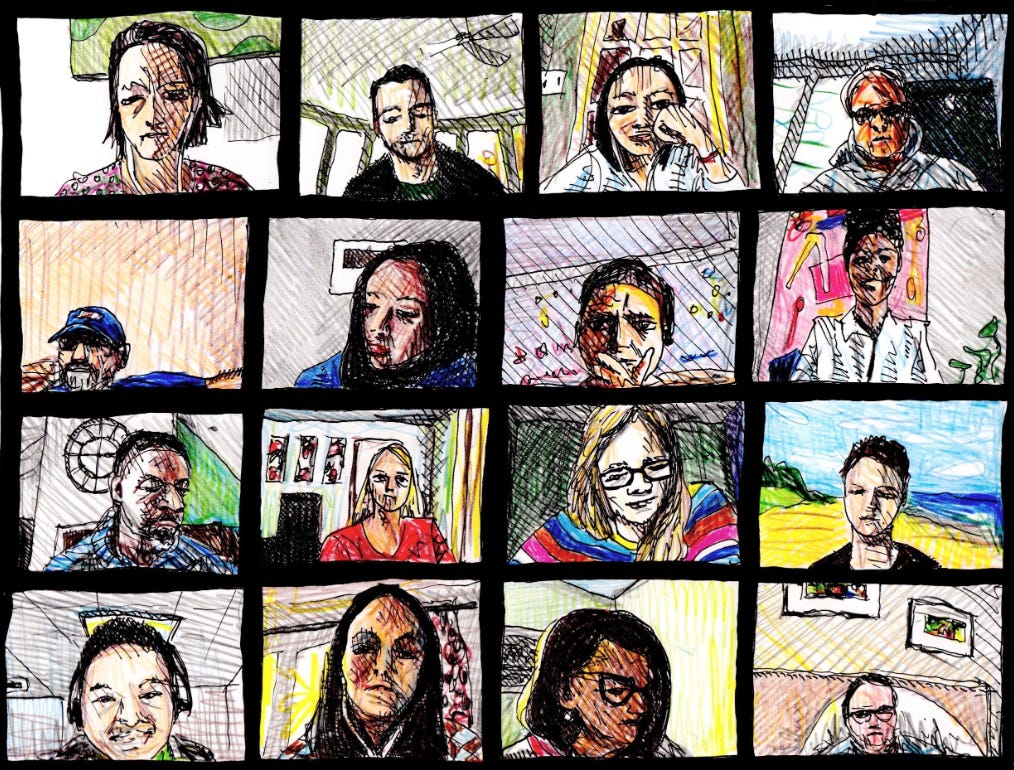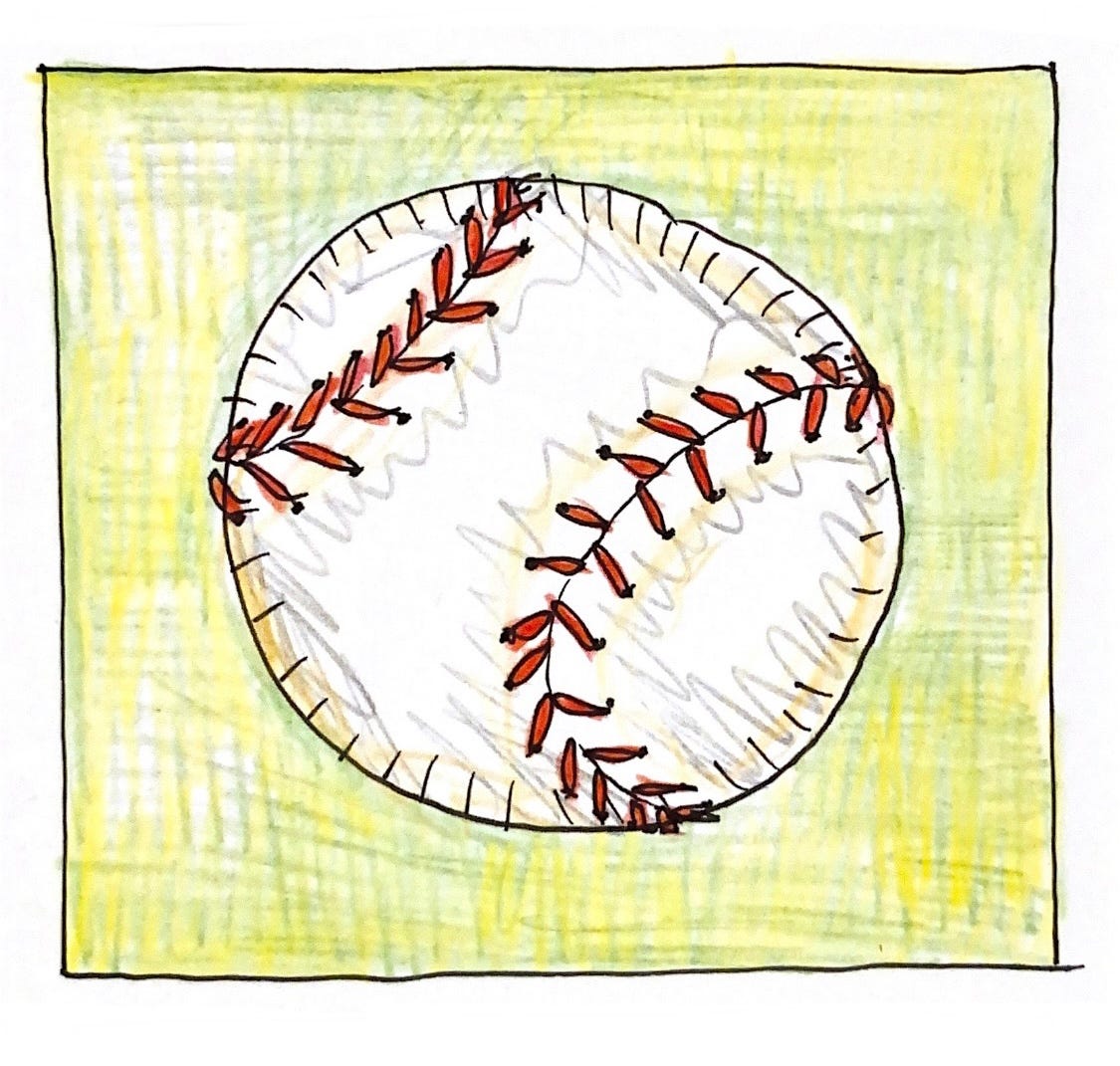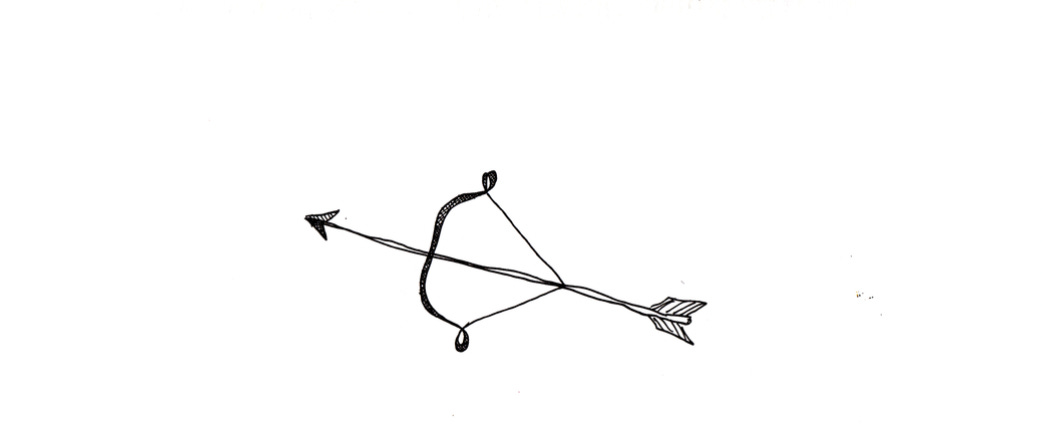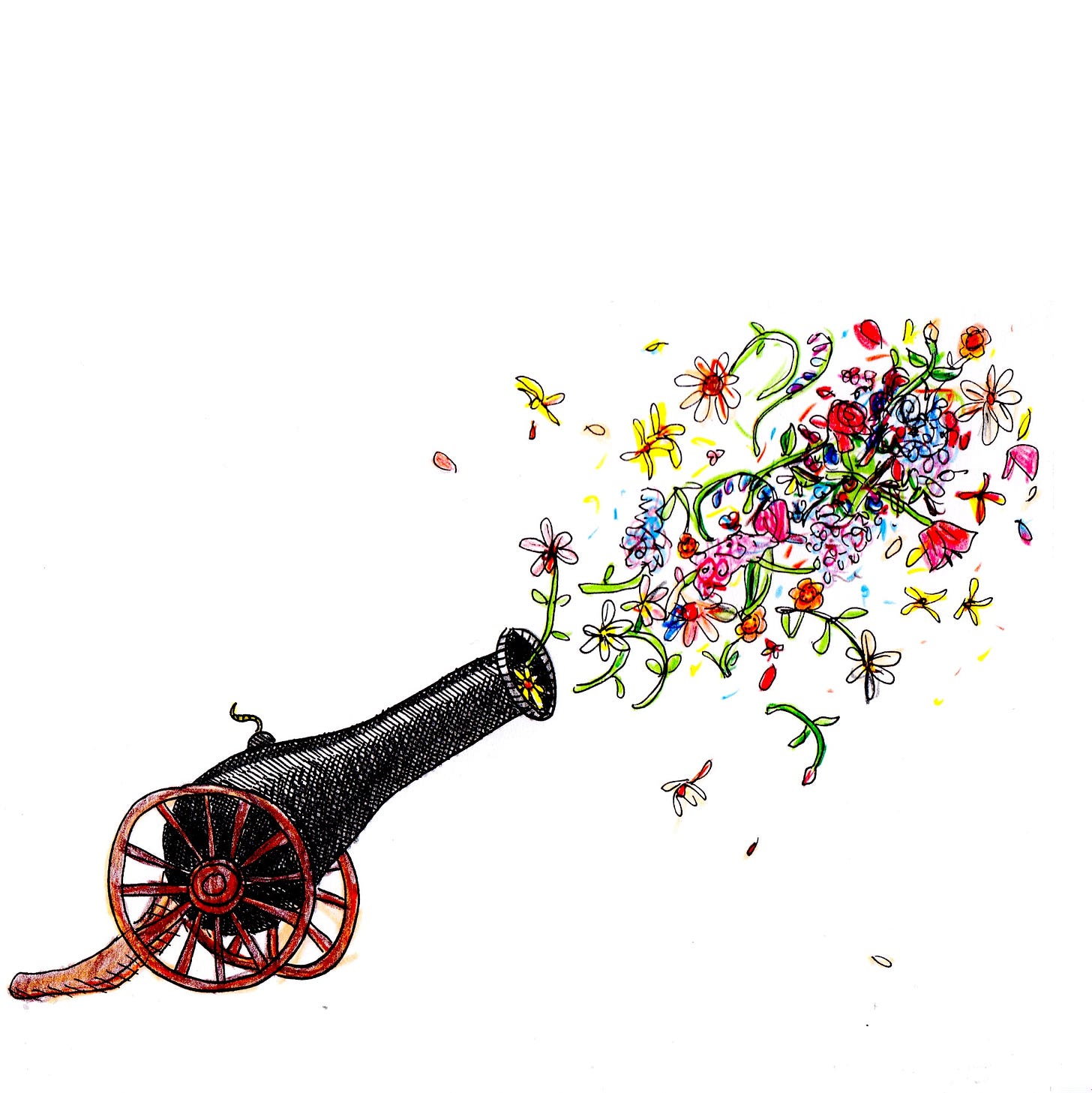Interview with a 54-Year-Old Sober Person: Kristi Coulter
"I don’t think being in recovery is hard. I think life is hard, and there is real horror in understanding that drinking cannot actually alter reality."
Hi. It’s The Small Bow. Reminder: we are funded entirely out of the pockets of paying subscribers. We use your money to help pay for all our freelancers and Edith’s artwork. If any of our newsletters over the past year have made you feel less shitty and alone, please consider signing up. Subscribers get access to the entire archive, the Sunday roundup of book and recovery recommendations, and the complete rundown of my weekly recovery program. Seriously—thanks for helping us. We need ya.
Welcome to another Tuesday in October, which brings us deep inside the dark heart of decorative gourd season, and regular TSB readers know that on the third Tuesday of each month, we collaborate with Oldster Magazine for the Sober Oldster Questionnaire. Welcome to the newcomers, and hello again to the oldcomers.
This month’s interviewee is writer Kristi Coulter.
“I’m so much less shy than I used to be! Sobriety basically forces you to work through or at least come to terms with your social anxiety. The idea that I ever needed alcohol to talk to a stranger seems bizarre to me now. I’m also more honest, though that was not a high bar to clear versus my drinking days.”
The full interview with Kristi starts after the jump. Prepare for some hard-won sobriety inside a flotation tank.
Thanks again to Sari Botton from Oldster for the collaboration.
How old are you, and how long have you been in recovery?
I’m 54 and I’ve been in recovery for eleven years.
How did you get there?
In my teens and 20s, I drank to party and to superimpose extrovert qualities on myself. In my 30s, drinking became a way to dull the toll of a high-powered and brutally stressful corporate career. By my early 40s, I was putting away a bottle of wine almost every night, and on some level, I was thinking about drinking 24/7: whether I had enough wine in the house, how to drink less, why my efforts to drink less kept failing, if I was doing enough yoga and consuming enough kale to cancel out the drinking, how much longer I could keep other people from noticing the drinking, and so on. Think of a song you loved in the mid-90s–maybe that one about standing in front of a broken phone booth with money in your hand–and then imagine it still playing full-time in your head decades later, under other songs and movies and conversations and even your dreams. That was my life.
I decided it must be an anxiety disorder that was causing me to think so persistently and fretfully about my drinking–that the thinking was the problem, not the drinking. So I spent several years on therapy and acupuncture and Reiki and so on while continuing to drink at least a bottle of wine a night. But I never got less anxious, and the song was still stuck in my head, getting louder, crowding out everything but itself.
One day, it hit me that one way to stop thinking about drinking all the time might be to actually stop drinking. I mean, I didn’t waterski or breed corgis, and I also never thought about those activities, so maybe alcohol would follow the same pattern. Of course, I quickly dismissed this idea as unworkable. But once I’d had it, I couldn’t un-have it, and one random Saturday, I woke with a hangover and thought, “Fine, I’ll give it a try.”
The first week was excruciating, terrifying–I thought about drinking even more, which I hadn’t known was possible. But within a month, my brain had space for other ideas, too. All this beautiful closet space had started to open up around me and I could decide how to fill it. Eleven years later, I’m still going.
I owe my late-blooming writing career to sobriety. As a young and drinking writer, I had plenty of raw talent but no stamina. I didn’t understand why occasional bursts of brilliance weren’t enough to get me where I wanted to be. As a sober (and older) writer, I understand that real mastery comes from long, grinding hours. Which is so unfortunate! But anyone who has rebuilt a life in sobriety knows how to put in long, grinding hours, and to keep faith that what looks like a pile of chaos can one day have form and meaning.
What are the best things about being in recovery?
I guess I really like having a self? Sometimes it can feel hard to define, but I still know it’s there, something at my core beyond basic survival. I’m also much more adventurous as a sober person, in areas ranging from travel to exercise to sex. After all, if something goes awry, I know I’ll have the mental wherewithal to stop, assess, and troubleshoot. So why not go out on a limb now and then? Limbs can be fun.
I also owe my late-blooming writing career to sobriety. As a young and drinking writer, I had plenty of raw talent but no stamina. I didn’t understand why occasional bursts of brilliance weren’t enough to get me where I wanted to be. As a sober (and older) writer, I understand that real mastery comes from long, grinding hours. Which is so unfortunate! But anyone who has rebuilt a life in sobriety knows how to put in long, grinding hours and to keep faith that what looks like a pile of chaos can one day have form and meaning.
What’s hard about being in recovery?
I don’t think being in recovery is hard. I think life is hard, and there is real horror in understanding that drinking cannot actually alter reality. My sobriety was cemented in year three, the night Trump was elected. I remember sitting on my kitchen floor in a state of shock and terror, wondering if this would be the night I finally relapsed. And then suddenly, I thought, “Drink if you want, but he’s still going to be president.” It feels ludicrous to type it out like this, but I don’t think I’d quite made the connection till then that drinking could not actually alter reality. It was the most desolate moment of my life and also the moment I really and truly got sober.
My sobriety was cemented in year three, the night Trump was elected. I remember sitting on my kitchen floor in a state of shock and terror, wondering if this would be the night I finally relapsed. And then suddenly I thought “Drink if you want, but he’s still going to be president.” It feels ludicrous to type it out like this, but I don’t think I’d quite made the connection till then that drinking could not actually alter reality. It was the most desolate moment of my life, and also the moment I really and truly got sober.
How has your character changed? What's better about you?
I’m so much less shy than I used to be! Sobriety basically forces you to work through or at least come to terms with your social anxiety. The idea that I ever needed alcohol to talk to a stranger seems bizarre to me now. I’m also more honest, though that was not a high bar to clear versus my drinking days.
Alcoholics often feel that they are somehow both superior and inferior to everyone else on earth. When I got sober, I started to realize that in reality, I’m often a lot like the general population. I’m pretty ordinary. I still chafe against that notion sometimes, but overall, I like being in gen pop.
What do you still need to work on? Can you still be a monster?
Oh, I suck in plenty of ways, and a lot of it comes down to still being a monster to myself. Early sobriety was the first time in my life that I had to be genuinely nice to myself, treat myself like a superhero for simply not drinking that day. I had been a very hard-driving, high-achieving person throughout my drinking years, and I prided myself on never demanding help or support or sympathy from anyone. Not being any trouble was my whole brand. Well, to get sober, I had to lower the stakes considerably and sometimes call my day a raging success based on nothing but not picking up a drink. It was an incredible experience, learning at age 43 that I could actually be decent to myself, and vulnerable with other people.
But at some point, not drinking stopped being an achievement and became my default. So, without even realizing it, I slid back into old habits of judging myself harshly for ordinary human failings or for having emotional needs. A while back, I went through a long period of pretending something in my most precious relationship on this earth was okay when it was actually causing me crushing pain. I simply forgot that as a member of gen pop, I’m allowed to say when something is hurting me, even if I don’t know how to phrase it elegantly. And of course my pain still shot out of me in all kinds of uncontrolled ways, which didn’t do the relationship (or anyone else around me) any good. I’ve worked hard in the last few years to just speak when I need to be heard, and to believe I deserve to be heard. But it’s an ongoing effort.
I also think more consciously about my recovery these days than I have in years. I think “In the last five years you went through a pandemic, perimenopause, the death of your mom, the death of your dog, a little televised coup, and some brutal shocks without drinking, blowing up your life, or even committing any felonies. Maybe you’re not so bad, babe. Maybe you deserve a pat on the back.” I think a lot about how much worse those five years would have been if I were still drinking.
What’s the best recovery memoir you’ve ever read? Tell us what you liked about it.
“Best” is hard, but Caroline Knapp’s Drinking: A Love Story is most indelible. I read it when it came out in 1996 and knew immediately that her story was my story, too. It was in the little details about being impatient when other people didn’t finish their wine fast enough, or always monitoring how much was left in the bottle. I kept drinking for another seventeen years, and I tried hard to forget how much like Caroline I was. But I couldn’t un-know what she’d shown me.
What are some memorable sober moments?
Sitting with Linus, my elderly golden retriever, the night before the vet would be coming over to put him to sleep, and watching grief and love and worry and gratitude and exhaustion play in harmony inside me. Prying an entire stick of butter (including foil) from the mouth of Waffle, my golden puppy, and suddenly understanding how “wine moms” get that way. Yelling my head off at a midnight Superchunk show this summer, a show I’d traveled two thousand miles alone to see. Having a dumb argument with my husband in early sobriety about something mortgage-refinance-related and feeling absolute disbelief that I couldn’t just drink it away. Attending a booze-soaked work event for two hundred people, blurting in agonized awkwardness to the stranger seated next to me that I was thirty days sober, and him responding, “My last drink was thirty-seven years ago. I’m so happy for you! You’ve made a wonderful choice.”
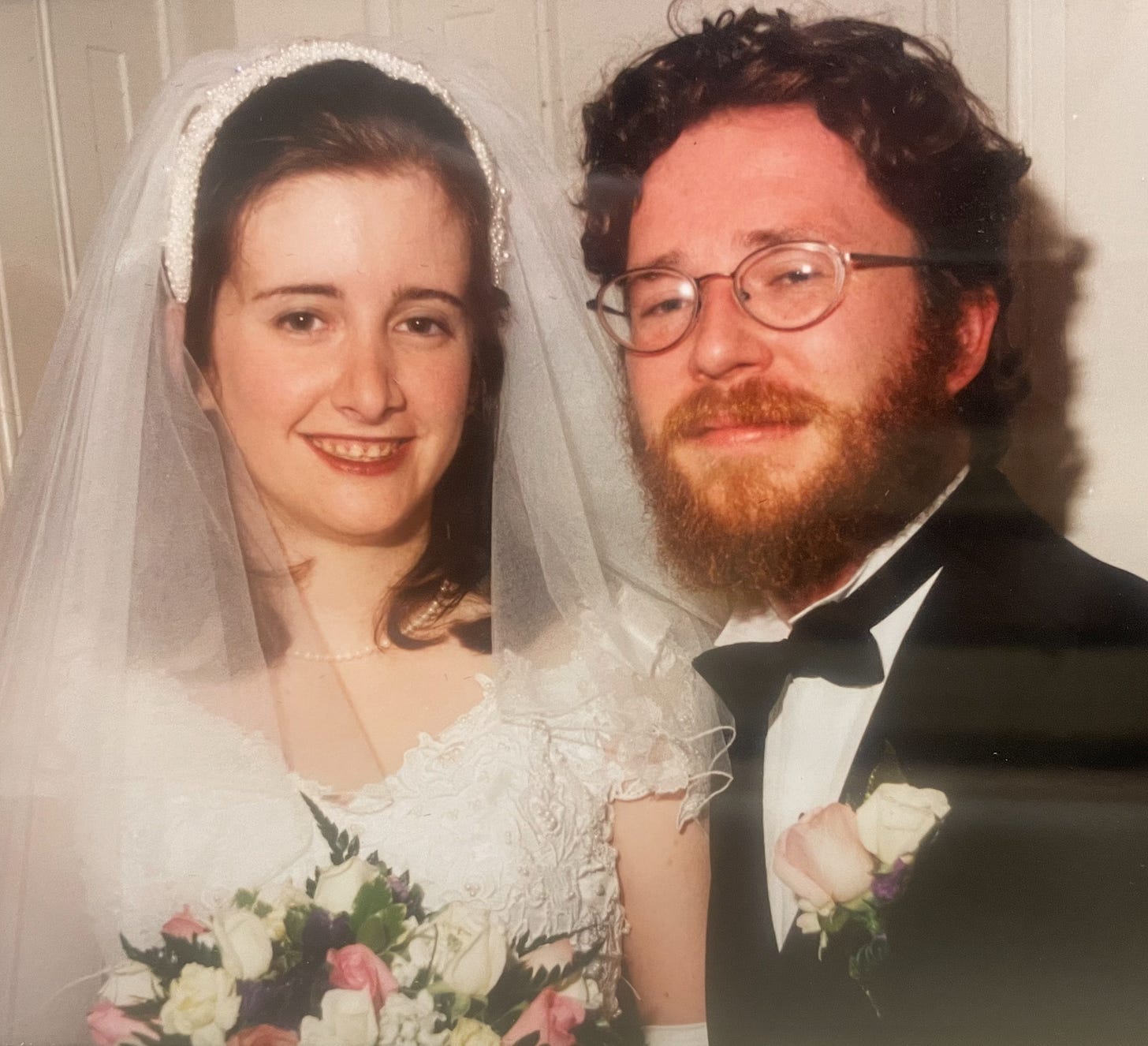
Are you in therapy? On meds? Tell us about that.
Both! My therapy these days involves EMDR and locating feelings in my body. I got to a point where just talking wasn’t going to get me much further. EMDR has done more to help me put traumatic experiences into perspective than talk therapy ever did. I also take anti-depressants and probably will for life, because when I don’t, sooner or later I inevitably experience a serious depression, and it’s debilitating. And pointless. Clinical depression isn’t productive like situational grief or melancholy can be. It’s pure destruction. People die from it. So I need to try and keep my brain healthy.
Early sobriety was the first time in my life that I had to be genuinely nice to myself, treat myself like a superhero for simply not drinking that day. I had been a very hard-driving, high-achieving person throughout my drinking years, and I prided myself on never demanding help or support or sympathy from anyone. Not being any trouble was my whole brand. Well, to get sober I had to lower the stakes considerably, and sometimes call my day a raging success based on nothing but not picking up a drink. It was an incredible experience, learning at age 43 that I could actually be decent to myself, and vulnerable with other people.
What sort of activities or groups do you participate in to help your recovery? (i.e. swimming, 12-step, meditation, et cetera)
I like to use my body to balance out my feverishly active brain. I jog, I lift heavy weights, I run sprints, I stand on my head. Now and then I try something new like bouldering or pole fitness, just to see if I have any natural aptitude. (I do not.) I’ve only dabbled in 12-step groups, mostly because I never found the right group for me. I always wound up in incredibly depressing meetings where men who’d been sober for forty years talked about how the disease was in the hallway doing pushups, getting stronger every minute, just waiting to take them down. I would leave feeling hopeless and despondent. If I’d found a group with some light and hope and humor in it, things might have turned out differently (and maybe they will yet).
That said, I talk to fellow alcoholics all the time, which is the core of any 12-step group. There are a bunch of women I met in a private Facebook group who all got sober around the time I did, and I think of them as sisters. Prior Sober Oldster Claire Dederer is one of my best friends, and sobriety is a thread in many of our conversations, whether the actual word comes up or not.
Oh, and I float. Regular meditation has never quite clicked for me. But put me in a flotation tank, and I can sometimes enter a pretty deep meditative state. I would have expected to end up in a deep panic state, so it was quite a surprise to find it so relaxing.
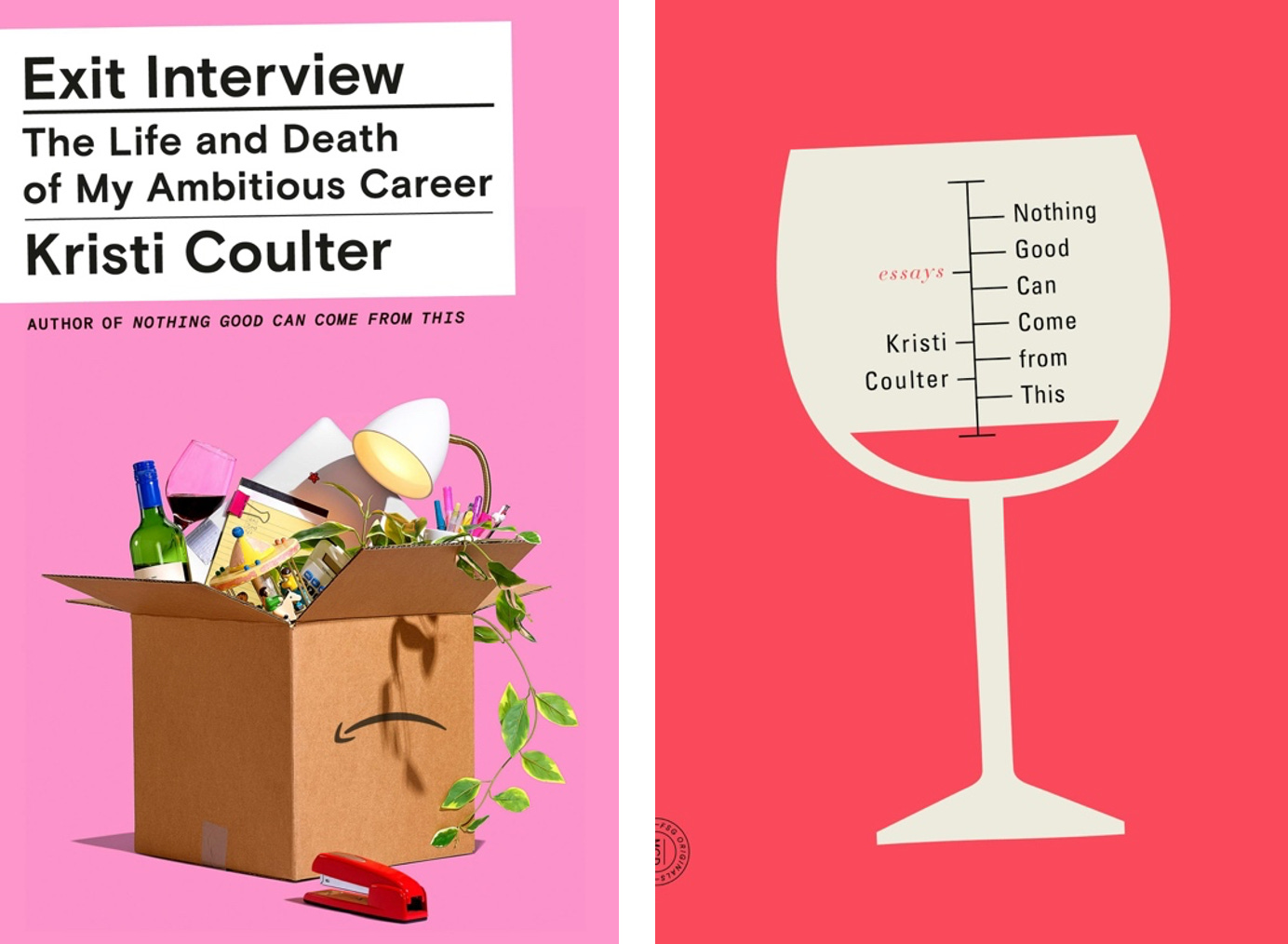
Are there any questions we haven’t asked you that you think we should add to this? And would you like to answer it?
I think you should have asked about my favorite addiction-themed movies. But no, I’m not going to answer. J/k: Jesus’s Son, The Spectacular Now, Drugstore Cowboy, Young Adult, Half Nelson, Rachel Getting Married, and Shame.
**********************************************************************
Kristi Coulter is the author of the memoirs Nothing Good Can Come from This and Exit Interview: The Life and Death of my Ambitious Career. Her work has also appeared in Elle, The Paris Review, New York Magazine, DAME, and a bunch of other places. She writes about movies (and sometimes music) at Loose Canon, her free Substack newsletter. She lives in Seattle and Los Angeles with her husband, John, and our dogs, Ella and Waffle.
******
This monthly interview series is a collaboration between Oldster Magazine and The Small Bow,
MORE IN THIS SERIES:
Interview with a 53-Year-Old Sober Person: Joan As Police Woman
Interview with a 60-Year-Old Sober Person: Claudia Lonow
*****
*****
*****
This is The Small Bow newsletter. It is mostly written and edited by A.J. Daulerio. And Edith Zimmerman always illustrates it. We need your support to keep going and growing.
We send it out every Tuesday and Friday. For $8 a month or $60 per year, you also get a Sunday issue and access to the full TSB archives.
Oh, do you like coffee mugs? We also have some amazing TSB merchandise for sale.
If you'd like to check in with me and learn more about our recovery meetings, here's where I can be reached: ajd@thesmallbow.com
Also, follow us on Instagram for updates and more illustrations from Edith.
ZOOM MEETING SCHEDULE
Monday: 5:30 p.m. PT/8:30 ET
Wednesday: 10 a.m. PT/1 p.m. ET
Thursday: 10 a.m. PT/1 p.m. ET (Women and non-binary meeting.)
Friday: 10 a.m. PT/1 p.m. ET
Saturday: Mental Health Focus (Peer support for bipolar/anxiety/depression) 9:30 a.m. PT/12:30 p.m. ET
Sunday: (Mental Health and Sobriety Support Group.) 1:00 p.m PT/4 p.m. ET
*****
If you don't feel comfortable calling yourself an "alcoholic," that's fine. If you have issues with sex, food, drugs, codependency, love, loneliness, and/or depression, come on in. Newcomers are especially welcome.
FORMAT: CROSSTALK, TOPIC MEETING
We're there for an hour, sometimes more. We'd love to have you.
Meeting ID: 874 2568 6609
PASSWORD TO ZOOM: nickfoles
Need more info?: ajd@thesmallbow.com
A POEM ON THE WAY OUT:
A Poem about Baseballs
by Denis Johnson
**************************
for years the scenes bustled
through him as he dreamed he was
alive. then he felt real, and slammed
awake in the wet sheets screaming
too fast, everything moves
too fast, and the edges of things
are gone. four blocks away
a baseball was a dot against
the sky, and he thought, my
glove is too big, i will
drop the ball and it will be
a home run. the snow falls
too fast from the clouds,
and night is dropped
and snatched back like a huge
joke. is that the ball, or is
it just a bird, and the ball is
somewhere else, and i will
miss it? and the edges are gone, my
hands melt into the walls, my
hands do not end where the wall
begins. should i move
forward, or back, or will the ball
come right to me? i know i will
miss, because i always miss when it
takes so long. the wall has no
surface, no edge, the wall
fades into the air and the air is
my hand, and i am the wall. my
arm is the syringe and thus i
become the nurse, i am you,
nurse. if he gets
around the bases before the
ball comes down, is it a home
run, even if i catch it? if we could
slow down, and stop, we
would be one fused mass careening
at too great a speed through
the emptiness. if i catch
the ball, our side will
be up, and i will have to bat,
and i might strike out.
— from Poetry Foundation
But if you really want to avoid the in-box clutter, feel free to donate $25 or more by pressing this button. This helps us pay for the production costs for the TSB Pod.
ALL ILLUSTRATIONS BY EDITH ZIMMERMAN



